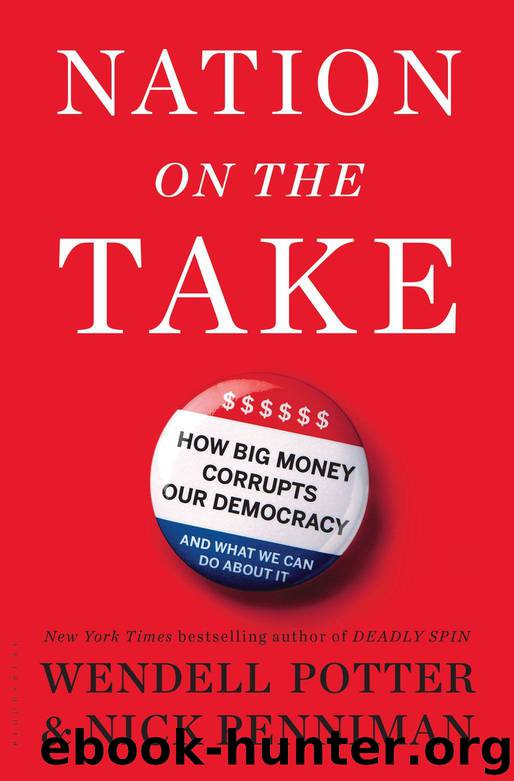Nation on the Take: How Big Money Corrupts Our Democracy and What We Can Do About It by Wendell Potter & Nick Penniman

Author:Wendell Potter & Nick Penniman
Language: eng
Format: mobi, epub, azw3
Tags: American Government, Business & Economics, Political Science, General
ISBN: 9781632861108
Publisher: Bloomsbury Press
Published: 2016-03-01T07:00:00+00:00
Influence of the Food and Beverage Industry: Lobbying spending and campaign contributions during the Bush and Obama administrations
Source: Center for Responsive Politics (opensecrets.org)
Once the USDA started unveiling those rules in 2011, both cafeteria food suppliers and the lunch ladies’ association had many objections. They didn’t like the requirements that sodium levels would have to be halved, fruits and veggies doubled, and fewer calories could come from potatoes.18
While the SNA’s complaints were making headlines, the food com-panies were already working behind the scenes in Washington—on Capitol Hill as well as at the Department of Agriculture’s offices on Independence Avenue—to keep their bottom lines from taking a hit. The industry’s strategy would be to lobby on each part of the lunch tray—from pizza to French fries to pasta—to weaken the rules.
Pizza as a Vegetable
The first big battle between the USDA and industry was over pizza. A loophole in the old rules had made the tomato paste in pizza count as a serving of tomatoes. (During the Reagan years, even ketchup was briefly considered a vegetable.) The USDA’s new rules closed the tomato-paste loophole, which meant that pizza could no longer get credit for containing a vegetable. Among the USDA’s concerns was the high sodium content—and in some brands, high sugar content—of tomato paste.
The Schwan Food Company, a privately held company with about $3 billion in annual sales and the biggest supplier of frozen pizza to schools, was especially upset with the tomato-paste ruling. In a letter to the USDA, the company, whose brands include Red Baron, Tony’s Pizza, and Freschetta, made the case that its products were important because they appeal to kids and keep them buying school lunches.19 In addition to the letter, Schwan began spending more than it ever had on lobbying. Along with the American Frozen Food Institute, the industry’s trade group, it spent about $600,000 on lobbying in 2011, an all-time high.
Another part of Schwan’s strategy was to appeal directly to members of Congress from its home state of Minnesota. The company succeeded in getting eight of the ten members of the Minnesota congressional delegation—including its two Democratic senators, Al Franken and Amy Klobuchar—to go to bat for it.20 Those efforts paid off after Klobuchar pressured Secretary of Agriculture Tom Vilsack to relax the rules. In a June 2011 letter to Vilsack, Senator Klobuchar touted the benefits of tomato paste, criticized the whole-grains mandate as far too tough and called the proposed decrease in sodium unattainable, especially “when serving a dairy based center-of-the-plate item, such as pizza.” As Minnesota Public Radio pointed out later, at least one sentence of Klobuchar’s letter was identical to the written testimony Schwan would soon provide to a congressional committee that was holding a hearing on the issue.21
Neither Schwan nor the American Frozen Food Institute had donated to Klobuchar’s campaign before 2009. That was soon to change. By 2013, they had donated thousands of dollars to her reelection campaign.22 In all, nineteen food and beverage groups gave Klobuchar’s campaign $160,000 between 2009 and 2011, double what they’d given her the three prior years.
Download
Nation on the Take: How Big Money Corrupts Our Democracy and What We Can Do About It by Wendell Potter & Nick Penniman.epub
Nation on the Take: How Big Money Corrupts Our Democracy and What We Can Do About It by Wendell Potter & Nick Penniman.azw3
This site does not store any files on its server. We only index and link to content provided by other sites. Please contact the content providers to delete copyright contents if any and email us, we'll remove relevant links or contents immediately.
| Anthropology | Archaeology |
| Philosophy | Politics & Government |
| Social Sciences | Sociology |
| Women's Studies |
The Secret History by Donna Tartt(19092)
The Social Justice Warrior Handbook by Lisa De Pasquale(12190)
Thirteen Reasons Why by Jay Asher(8912)
This Is How You Lose Her by Junot Diaz(6887)
Weapons of Math Destruction by Cathy O'Neil(6281)
Zero to One by Peter Thiel(5802)
Beartown by Fredrik Backman(5756)
The Myth of the Strong Leader by Archie Brown(5509)
The Fire Next Time by James Baldwin(5447)
How Democracies Die by Steven Levitsky & Daniel Ziblatt(5219)
Promise Me, Dad by Joe Biden(5154)
Stone's Rules by Roger Stone(5088)
A Higher Loyalty: Truth, Lies, and Leadership by James Comey(4964)
100 Deadly Skills by Clint Emerson(4926)
Rise and Kill First by Ronen Bergman(4790)
Secrecy World by Jake Bernstein(4753)
The David Icke Guide to the Global Conspiracy (and how to end it) by David Icke(4720)
The Farm by Tom Rob Smith(4514)
The Doomsday Machine by Daniel Ellsberg(4490)
